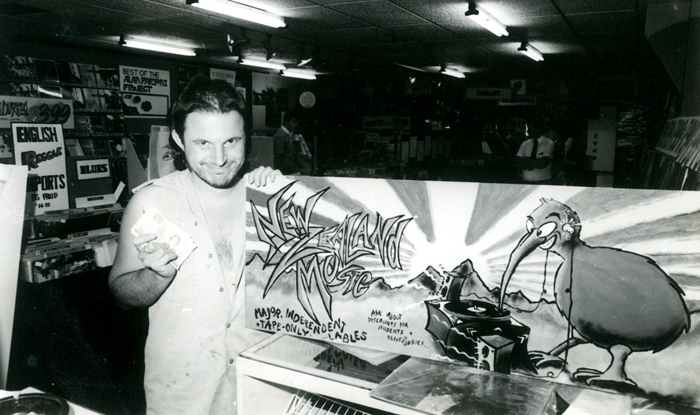
Chris Knox with the indie banner, 1983 - Kerry O'Connor collection
Durham Street
Durham Street West, in Auckland's CBD, was a fairly dreary address in 1979. The arcade, which until the 1980s housed the entrance to the now demolished His Majesty’s Theatre, was slightly tatty and in decline. The Radio NZ building still housed 1ZB, 1ZM and a splendid radio theatre, and despite its deco design, from the outside it was anonymous and weathered. The remnants of Brown’s Mill Market would soon hide punk palace Zwines and another, very short-lived second nightclub, Babes, which was destroyed in a late night blaze started by its owner. There was a massage parlour up one end, and halfway along was the entrance to The Record Warehouse.

Record Warehouse, Durham Street West, Auckland - Kerry O'Connor collection
The Record Warehouse was sanctuary from the tedium of Muldoon-era Auckland.
The record buyer was met with a long vista of cobbled together wooden drawers, stuffed with vinyl albums in haphazard order, a service counter and little else. But for those who worked inside and for much of the existing Auckland music community, The Record Warehouse was sanctuary from the tedium of Muldoon-era Auckland.
Record Stores
In 1981 there were an astonishing 11 dedicated record shops between Karangahape Rd and Customs St. The Peaches stores, Music City in Vulcan Lane, the EMI record stores, Henry King’s Sounds stores, 256 Records, Marbecks and a much smaller Record Exchange, which would eventually morph into Real Groovy Records. The eccentric and wonderful David Perkins ruled his two Taste Records shops. By 2014 there were just two, Real Groovy and Marbecks.

Mike Dow (right) and EMI's Andy Yvasis - Grace Cardwell Scouller collection
The Record Warehouse was the creation of an unlikely duo: Guy Morris was creator of Direction Records, the first NZ record label with its own stores and its own magazine, Hot Licks. The cigar-chomping Michael Dow was boisterous and entrepreneurial to his core, an ex-petrol industry man who would take to the mad 1980s with a gusto few could match.

Dave Perkins of Taste Records. - Grace Cardwell Scouller collection
True to their name, most record shops in the late 70s traded in vinyl records. Some stocked the newest format, the cassette. CDs were still a glint in the eye of record companies and not yet for public sale.
Stores opened Monday morning and closed, in the inner city at least, by 9pm on a Friday night. From the beginning The Record Warehouse stayed open until 9pm Monday to Friday. Saturday trading, or perish the thought, Sunday trading, was illegal in New Zealand save for a few garden centres, one of the many baffling anomalies of a still unionised and heavily regulated New Zealand. Dow and The Record Warehouse were to play a pivotal and expensive part in altering that reality.

The author in his Record Warehouse office - Grace Cardwell Scouller collection
The Beginning
I stumbled into this burgeoning world of record retailing fresh from a period of employment in the San Francisco store of the large US chain, Tower Records. Rock A-G was my domain. Back in Auckland, I was employed almost immediately by the Peaches store in The Corner (formerly John Courts, now Whitcoulls) and in even less time was pounced upon by a driven Mike Dow, who was keen for any nuggets of retail brilliance from Stateside he could inject into his Durham Street store.
MUSIC WAS CHANGING FAST AS PUNK AND NEW WAVE TITLES BEGAN FLOODING INTO RELEASE
I had one: Tower Records mass displayed everything. There were single copies of albums in structures that were far more sturdy and attractive than Dow’s pilfered dressing table drawers displayed atop old tables. But everywhere else titles rose hundreds high in floor stacks or more importantly in floor to ceiling facings. Especially for new releases. You entered a Tower store and the 30-strong facings for 12-inch copies of the new Tom Petty album cover were difficult to avoid.
For Dow, it was an instant revelation. By week’s end he had carpenters slamming together racks of shelves to fill the large cavernous space on all sides. Mass market retailing of records in New Zealand was born and I had another job.
Record companies, accustomed to small sell-ins and very limited exposure for new titles, were quick to see the potential. The Record Warehouse had the space to display numerous titles in apparent bulk. Music was changing fast as punk and new wave titles began flooding into release. A Joy Division album at The Record Warehouse could share equal frontage with the new Neil Diamond or a TV-promoted compilation.
Deals and discounts
Dow wanted deals and discounts. He wanted the titles to fly off the shelves, so he undercut all rivals, much to the fury of David Perkins at Taste Records, who famously called Dow and me, “immoral charlatans who would be out of business within the month.” A year later, in the upstairs bar of the Queen’s Ferry, he could still find few redeeming features in the Record Warehouse modus operandi. He reluctantly conceded though, that it might survive another month or two.
Upstairs in the Durham Street store there was a space almost equal in size to the cavernous lower floor. A hastily constructed set of stairs welcomed punters to the instantly created “Jean Warehouse”, an enterprise so short-lived and obviously unwelcome it evaporated in a denim puff, to be replaced with what was a relatively new musical format, cassettes – the "Cassette Warehouse". Builders, always Dow associates, quickly thrashed out what were supposedly thief-proof display cases.
Downstairs, the stock take and sales of many punk titles abysmally failed to match. The losses inflicted due to theft of the much smaller cassette format alarmed the owners. Staff recall with mirth and frustration initially having to retrieve every title from under a glass case, and later, only empty cases adorned walls, with reggae titles being the quickest to elude the tills.
The RW Circus
Guy Morris was somewhat bewildered at Dow’s frantic growth strategy as he placed bids to buy the Peaches chain of stores and discussed opening even more Record Warehouse branches. Morris retreated to run his second hand store on upper Victoria Street and I became the second shareholder.
Seven record wholesalers (WEA, CBS, Festival, RTC Virgin, PolyGram, EMI and Music World) had sales reps coming in on a weekly basis, offering new releases and back catalogue titles with ever increasing pressure to produce sales returns for largely overseas owners. Release dates of major titles became closer to UK and US dates. Promotional material and television and magazine campaigns became much more coordinated.
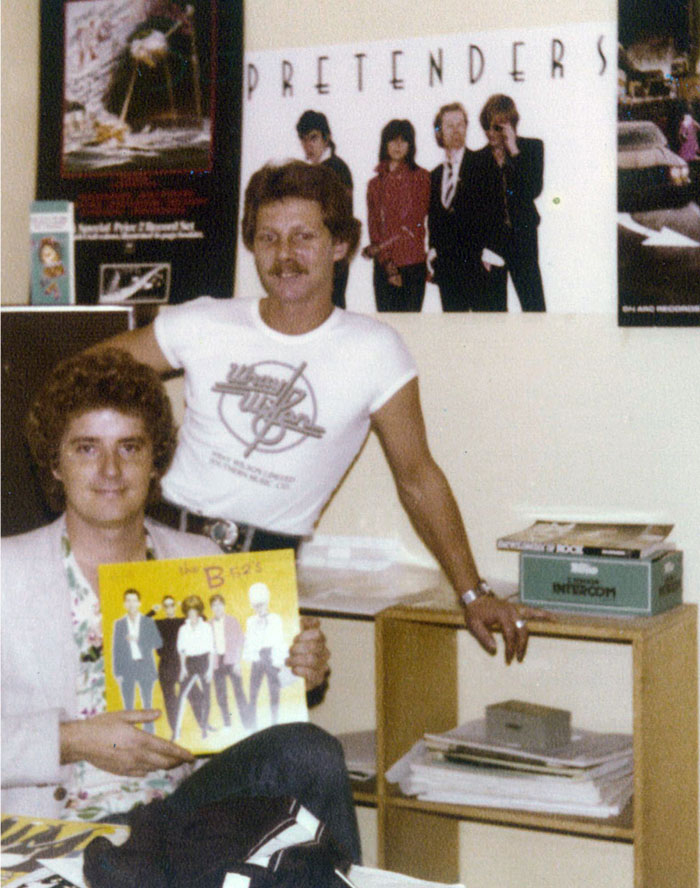
"The Sell In" - Roger King with WEA's Clark Flanagan, 1979 - Kerry O'Connor collection
In particular, The Record Warehouse and later, Sounds stores, offered the opportunity for a high profile retail release. Each company employed specialist in-store promotional people to further embellish displays. Demands for sometimes ludicrously large buy-in amounts of new titles by sales reps were confounded by record company credit departments, who kept The Record Warehouse in a constant state of stop-go credit.
By necessity, sales reps were brash creatures and Monday sales visits bore witness to some strange events. Two of the loudest, funniest and most effective were Murray Thom of then CBS and Jack Klutz from Festival Records. Thom’s employers would have been horrified to witness their main sales rep, each time a title was rejected, nodding and hurling the sample into Durham Street to be crushed beneath the wheels of passing cars. He rapidly progressed to become the youngest managing director of a record company in NZ history.

CBS sales manager Murray Thom and Chris Caddick at Record Warehouse around 1981. Thom would go on to be the youngest managing director of a record company in New Zealand and release a series of huge selling albums in the 80s, 90s and 00s via Thom Marketing. Caddick was later managing director of EMI and chair of Recorded Music New Zealand.
The Downtown EMI shop produced Chris Caddick, who eventually became managing director at EMI in New Zealand, and head of RIANZ (which later became Recorded Music New Zealand).
Heads of record companies, men like Tim Murdoch of WEA, Stuart Rubin of PolyGram, David Snell of EMI and the eminently likeable and paternal Jerry Wise of Festival, oversaw a time of rapid expansion and healthy budgets. They courted Dow with contacts and credit. WEA in particular, had regular overseas ambassadors who would single out The Record Warehouse for visits, often bearded and dressed in shiny baseball jackets, including the legendary Atlantic Records founder Ahmet Ertegun.
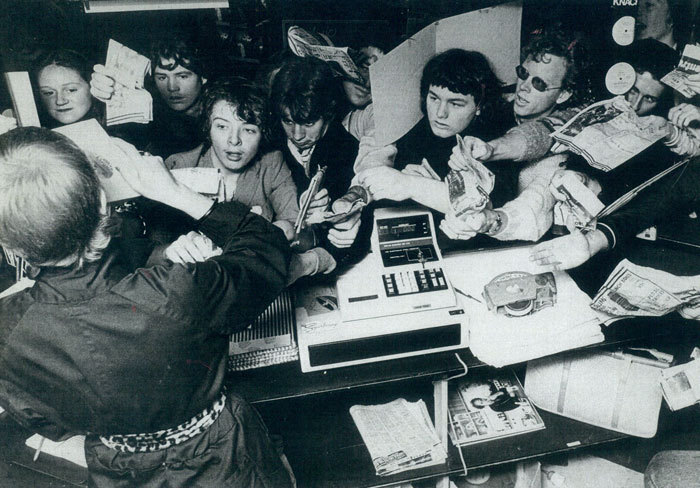
Public Image Limited fans besiege Record Warehouse for a free single for which they needed a voucher printed in the newspaper - Grace Cardwell Scouller collection
Barcoding and scanning albums had yet to enter retailing as a means of registering sales and maintaining effective stock control. In a rush of blood to the head The Record Warehouse decided to design its own bespoke system. All incoming stock was registered on a massive, clunky computer in the upstairs offices, and stickers were printed off and individually affixed to every album and cassette, with a scanner installed at each store counter.

Trevor Reekie behind the counter at Record Warehouse, 1983 - Kerry O'Connor collection
The system was a disaster and was so expensive and unwieldy it threatened the very survival of the stores. In theory it was another example of Dow’s brilliantly progressive thinking. In reality, scanners either didn’t work or registered incorrect information. Staff spent endless boring hours affixing dodgy stickers and even more pulling them off again. The sheer number of hours devoted to maintaining the system sadly far outweighed its benefits.
The resulting sales data, intended to assist with buying decisions, frequently bore no relation to reality. Soon the whole system was dumped and the computer repurposed to hold real estate records and contacts. Today, virtually every retail store has a refined system of the prototype that Dow and The Record Warehouse developed at great cost.
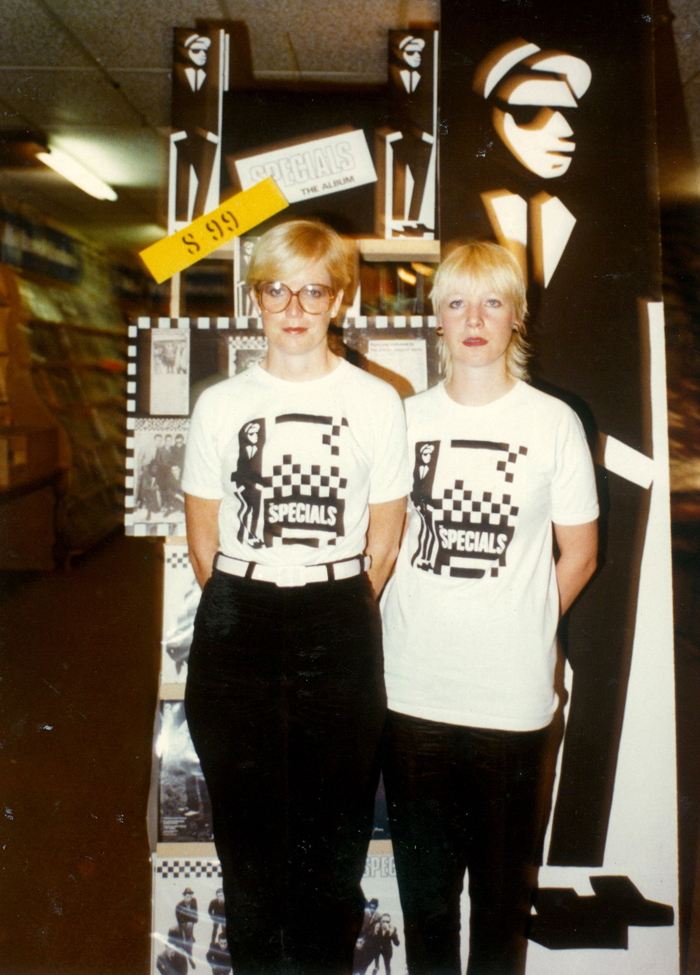
Grace Cardwell Scouller and Kerry O'Connor - The Specials!! - Kerry O'Connor collection
Promotions and charts
New releases demanded noisy, brash retail support. The Record Warehouse and Mike Dow in particular were mana from heaven. Dow didn’t even need to have the album in stock to rack up top five sales. Supertramp’s Breakfast in America released in two weeks? No problem. Durham Street will open at 7am, staff will wear pajamas and cook you a free breakfast. The customer buys a voucher, heavily discounted to $6.99 guaranteeing a copy of the album in seven days. They lined the street to buy vouchers. The album was No.1 for 10 weeks. Albums by The Specials and Pink Floyd received equally memorable events.
Even a slightly bemused and confused parliamentarian, Minister of Justice Jim McLay, found himself at The Record Warehouse, presenting gold discs to DD Smash in 1982.

The Minister of Justice uncomfortably presenting gold discs to DD Smash in 1982
The New Zealand music sales chart in the early 1980s was a very haphazard and unreliable affair. Only certain “chart return” stores, of which The Record Warehouse was a very important cog, were issued sheets on which to document weekly album and singles sales. Record store workers were often bipartisan creatures and while the best may smile and thank the buyer of Kamahl’s Greatest Hits they were much more likely to tick the new Toy Love album’s box a few more times than actual sales deserved. There were some laughable entries and exits of tracks, particularly punk and new wave titles from overzealous shops, which infuriated the record companies, who were spending big bucks on getting the latest Bee Gees opus into a No.1 position.

Adrienne Rickey at Record Warehouse. Rickey later worked with agent Mike Corless, one of two key live bookers in Auckland in the early 1980s. - Kerry O'Connor collection
The well-lauded singles department at Durham Street, maintained by Kerry O’Connor, was possibly the most carefully curated in the country and scrupulous in maintaining chart accuracy. The album and cassette divisions were not quite so reliable. It was rumoured that sales and reportage of sales from The Record Warehouse stores alone was enough to propel a title to the top of the chart for a week.
Kerry O’Connor convinced me to buy the entire first pressing of AK79. And to pay BRYAN Staff upfront for it.
From its inception The Record Warehouse was a strong supporter of New Zealand music. Not all record retailers shared the enthusiasm for the output of Flying Nun, Propeller, Ripper Records or their fellow labels. Kerry O’Connor was The Record Warehouse ambassador for all things local, none more so than the release of AK79, the 1979 compilation from Bryan Staff featuring a number of Auckland based punk bands. Kerry convinced me to buy the entire first pressing of AK79. And to pay Staff upfront for it. The Record Warehouse had a brief market exclusive. Ripper Records had funds for a second pressing. Such was Kerry’s enthusiasm for small label singles she almost singlehandedly kept some titles charting through her own sales. Many a customer left clutching a New Zealand single they had not intended buying — until Kerry explained the error of their ways.

The winner of a Specials promotion smashes a TV in Durham Lane West, 1980 - Grace Cardwell Scouller collection
Genres
The early 80s produced musical genre conflicts. One was disco and the other classical. Both sat uncomfortably in the predominately rock and roll retail ethos The Record Warehouse had created. Attempts were made to create special environments for each, the most amusing of which was a special disco store in Darby Street with its very own lit, multi-coloured dance floor. The concept and shop flopped, to nobody’s great surprise.
Classical music was treated with greater respect. Former Pye and RCA man Fred Noad was installed as the classical buyer and head of department. At least twice the age of any other staff member, with his pipe and cardigans, Fred at first cut an odd and amusing figure to the terminally hip younger staff. But he rapidly enjoyed an affection and respect that he seemed to visibly enjoy despite his surroundings. A short lived banishment of his section to the rear of the store was quickly seen as the token effort it was. Fred and his classics headed upstairs away from the nasty noise.
In-stores
Many overseas artists were touring the Antipodes in the late 70s and early 80s. Many arrived not to play shows but to do interviews and promote their wares. If they were in Auckland then in Mike Dow’s opportunistic mind they should also be making an appearance at his biggest store to sign albums.

Kate Bush meeting fans and signing autographs at Record Warehouse, 19 October 1978. - Bruce Jarvis Collection, Auckland Libraries Heritage Collections 1704-1801A-21

Kate Bush, on her way from an appearance at Record Warehouse, Auckland, 19 October 1978. To her right working as security is professional wrestler, stunt man and actor's agent Robert Bruce. - Bruce Jarvis Collection, Auckland Libraries Heritage Collections 1704-1801B-25
The first was Kate Bush, high on the success of her first album. Her in-store appearance at Durham Street, her first anywhere, ever, was bedlam. Her record company had wisely hired security (Robert Bruce the wrestler and soon-to-be talent agent). The crowd was so large and unrelenting Bush had to exit from a rear window in the store.

Roger King, EMI's Andy Yvasis, The Knack's Doug Fieger and Grace Cardwell Scouller at Record Warehouse in 1979. The Knack had, this day, just gone to No.1 in the US with their album Get The Knack. - Kerry O'Connor collection
The Knack were told their album had reached No.1 in the States as they signed albums at Durham Street. Madness gave startled punters an unexpected free but illegally printed T-shirt with each signed album, under the livid and uncomprehending eye of the same David Perkins of Taste Record – now of screen printing company Snake Studios, who roundly cursed “the irrelevant upstarts” for handing out his products so freely.

The instore frenzy during the Madness visit, with Robert Bruce on security - Grace Cardwell Scouller collection
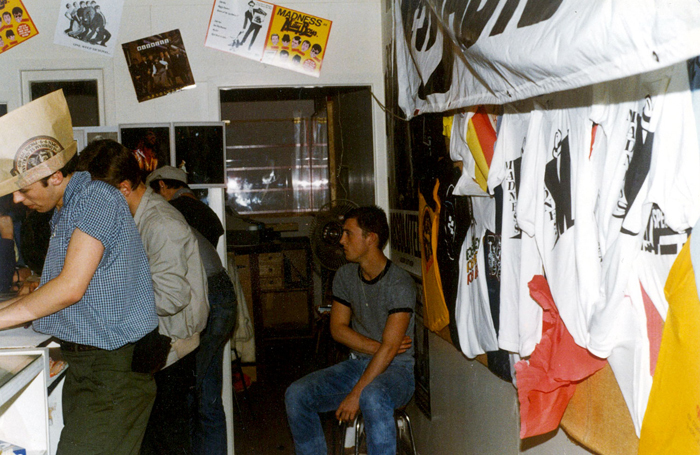
Madness signing records at Record Warehouse (and giving away T-Shirts) - Kerry O'Connor collection
Two of the Police (Sting was unwell and not there) made an appearance, the shorter of whom wished to share his passion for a staff member, much to her annoyance as she was chased upstairs and down by him. Legendary producer and nutter Kim Fowley also became devoted briefly to another Record Warehouse staff member and was furious at the pitiful amount of Kiss Alive 2 purchased by the store, on which Fowley shared a co-writing credit.

Billy Idol at Record Warehouse - Kerry O'Connor collection
Other stars visited, names that have largely now slipped from public consciousness, but in the early 80s they packed both the store and the street with fans: Leif Garrett, Alan Parsons, Billy Idol, and later in the Lorne St store, ZZ Top, Stevie Ray Vaughan and Duran Duran.

Steve Stevens and Billy Idol instore at Record Warehouse, 1983 - Kerry O'Connor collection
The depth of back catalogue vinyl available in the Durham Street store attracted famous customers scouring the bins in sunglasses and arriving at the counter laden, asking that it all be charged to their record company. The B52s, Elvis Costello, and Cheap Trick – the drummer of whom, Bun E Carlos, was so lost in his search that he only emerged as the shop was being locked at closing time, the remainder of his entourage long gone. Which was how he found himself fronting the fearsome Colin, bartender at the upstairs Queen’s Ferry, buying drinks for the Monday Night Problem Drinkers Club, a loose amalgamation of music industry buyers and reps and staff whose intake usually meant the industry had a very slow start to Tuesday.
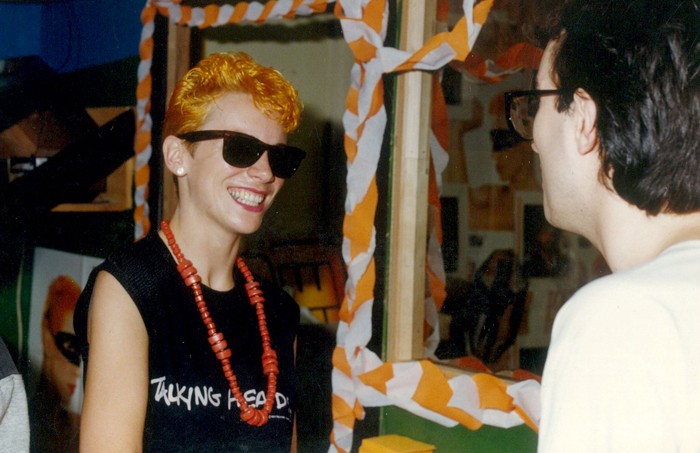
Annie Lennox instore at Record Warehouse - Kerry O'Connor collection
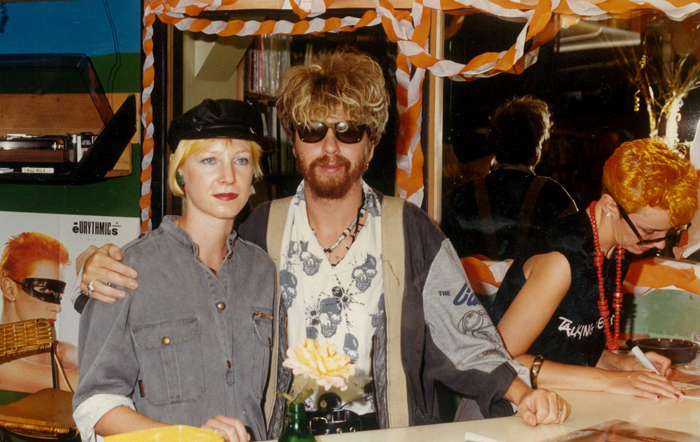
Kerry O'Connor with Dave Stewart (and Annie Lennox) at Record Warehouse - Kerry O'Connor collection
Kerry O’Connor recalls an evening dining with Michael Dow and producer/ artist/ manager/ self-promoter extraordinaire Malcolm McLaren. “In so many ways they were really alike, Malcolm and Michael really sparked off each other.”
Saturday trading
Relations between Dow and radio personalities were always mutually advantageous. The Record Warehouse spent well for a retailer on radio and the familiarity with some jocks who frequented the store was replicated in on-air largesse.
Mike Dow was a creature of the 80s. He drank bubbly late in the High Street clubs. He liked the music most people bought. He loved Supertramp and The Eagles. His friends were gamblers who partied hard and were not afraid to roll the corporate dice over and over. He would move on to Direct Contact, a real estate listing company, and Flower Warehouse in College Hill, before successfully selling real estate in Omaha Beach prior to his death from cancer in 2009.
An inability to trade on the weekend frustrated Dow and he set off on a campaign, starting almost single-handedly, to change the law (as he would soon after to allow the introduction of FM stereo broadcasts into New Zealand).

Record Warehouse staffer James Blackwood with the Rob Muldoon figure used for a promotion - Grace Cardwell Scouller collection
Approaching a group of likeminded business owners, largely on Auckland’s Queen Street – people who wanted the law revoked but were unwilling to expose themselves to prosecution by opening – he built up a defence fund. Week after week Record Warehouse in Durham Street would open on a Saturday morning for five hours. Punters poured in, as did a custodian of workers’ rights from the Labour Department to issue hefty fines for each breach. When other maverick retailers started to open on Saturday mornings, Dow took legal advice that was discreetly circulated to them and which largely thwarted the effectiveness of blitzes by Labour Department inspectors.
Staff were conflicted. Accusations of helping to inflict onerous work hours on other workers stung but the change was inevitable.

Roger King, Chris Caddick and Greg Cobb at a Record Warehouse function - Grace Cardwell Scouller collection

Glory Days: Record Warehouse staff fly to Sydney to see Bruce Springsteen, courtesy of CBS. From left: Kerry O'Connor, Richard Ludlum, and John Bray. - Kerry O'Connor collection
The End
I relinquished my shareholding in 1982 to manage the brand new DD Smash. Robert “Ramblin’ Bob” Blair took up the managerial duties. Of the originals only Kerry O’Connor, Robert Blair, Grace Cardwell Scouller and Jane Sparks remained. Soon after, Dow was encouraged to relinquish the Durham Street premises for a “smarter, much more modern” shiny retail space on High Street. Spurred by advisors outside The Record Warehouse circle, he oddly rebranded as Rio and outfitted the store with modern fittings that seemed soulless and distinctly un-rock and roll. It was the start of a quite rapid decline as debts mounted, business shrank and Dow’s interest moved to new pastures.

Roger Jarrett, founder of Hot Licks magazine, with WEA's Marilyn Bent, at Record Warehouse - Grace Cardwell Scouller collection
At its height The Record Warehouse had its name above the doors in five inner city locations, including the midsized Corner and Vulcan Lane versions and the tiny Darby Street and Queen’s Arcade stores. However to most the heart and soul of The Record Warehouse resided in the big funky cavernous Durham Street store. When its doors closed so did a small but deliciously vibrant part of many people’s lives.
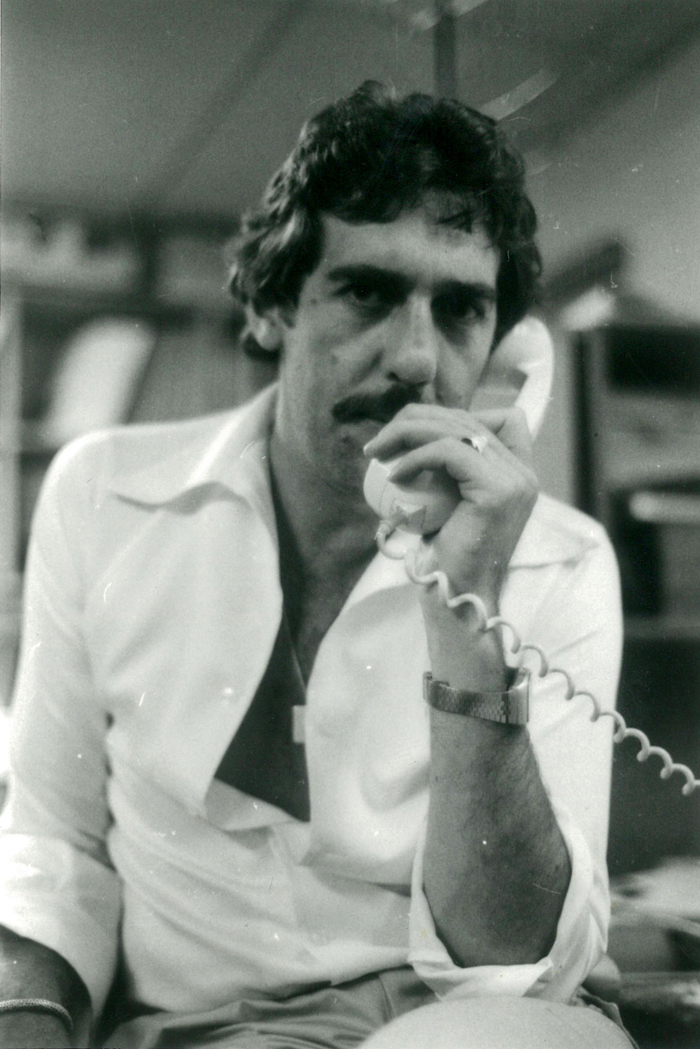
Michael Dow - Kerry O'Connor collection
Manning a market stand in a much later incarnation of my working life, to my astonishment a guy in his teens walked by me wearing a slightly faded The Record Warehouse T-shirt, the image lifted from an old RW bag – the Dick Frizzell designed “stoned cat in front of gramophone” picture.
“Where did you get that?” I quizzed him with possibly worrying enthusiasm.
He shrugged. “Some place on K Rd.”
“Why, do you know anything about The Record Warehouse?” I asked expectantly.
Another shrug. “Nah, just thought it was cool,” he said.
Yes it was. Very cool.
--
Roll Call
Michael Dow
Guy Morris
Roger King
Robert Blair
Kerry O’Connor
Grace Cardwell/Sloan
Simon Berry
Sharon Tuapawa
Fred Noad
Jane Sparks
Adrienne Rickey
Richard Ludlam
Dorrie
Suzie Levens
Trevor Reekie
Phil Twyford
James Blackwood
John Bray
Dave Rutherford
Jimmy Macken
Barry Brooks
Anna Allpress
Kayana Buffalora
Steve Heim
Josephine O’Neill
Mark Phillips